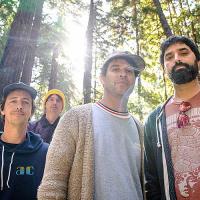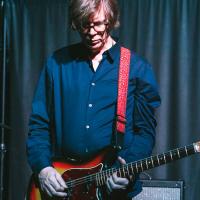Del The Funky Homosapien

"It ain’t the Black Power movement anymore."
Interview by Brian Peterson
Nas put out an album called Hip-Hop is Dead in 2006 that sparked endless discussion. Some took offense to the album’s title and pointed toward hip-hop’s presence within seemingly every facet of our culture as evidence that hip-hop is at its pinnacle. Others, however, saw this exact same trend as proof that hip-hop, at least in the realm of the mainstream, had cashed in its soul. While strong arguments can be made from either perspective, Del the Funky Homosapien, one of the most unique emcees of the past two decades, has quietly produced a body of work like that of a meticulously sharpened machete, complete with brilliantly metaphorical and insightful tales that slice up feelings of awe right alongside belly laughs. Although Del’s reputation has remained strong in both fan and critic circles, his presence has been missed—his last solo album came out in 2000 (Both Sides of the Brain). Hampered by some personal demons, Del stayed out of the limelight for a bit, but he continued to make music on the sly and, most importantly, got his head on straight. The end result is 11th Hour (Def Jux), a brand new full-length that digs deeply back into the very spirit of what made Del, as well as any other hip-hop groundbreaker, great in the first place. The record is stacked with beats thick as molasses and a flow that pulsates with hunger. To put it simply, 11th Hour is proof positive that hip-hop is alive and well, provided listeners put their trust in artists as creative and hard-working as Del. Del recently spoke with Thrasher about his creative inspirations. Rest assured, 11th Hour is merely the beginning of what he has in store for hip-hop fiends.
How does 11th Hour differ from the albums that you’ve done in the past?
With 11th Hour, my whole thing was to try and go back to what I did on the first album (I Wish My Brother George was Here). I want people to know what I’m talking about without obscuring the point. I don’t really tell stories necessarily; it’s more of a freestyle flow, but I do have concepts on certain songs. There are a lot of things I’m saying and I like it that way. Each song is like its own little world.
How do you channel into one of those worlds when you’re writing a song?
A lot of the things I talk about are day-to-day things I go through and how I get around them. But I just try to fit the mood of what the music’s doing. Also, when I’m writing I try to flow in a certain way, where my flow will complement the rhythm that’s already dominating the music. Even if you don’t completely listen to my lyrics, you can still feel my flow and hear what’s going on. If you want to get deeper into it, there’s substance there, too, though.
What keeps you wanting to come from an authentic place that’s real to your experience?
I just make my stuff the way I make it. I don’t worry about money. If I start worrying about money, it’ll mess up my whole creative process. My motive for making music is to make something that people like. If they like it, hopefully they will buy it.
Why do you think that so many different recording artists get caught in that money trap instead of trying to stay true to themselves?
Because when you get older, you need money. When the bill collectors come knocking on your door and rapping is all you can do, you start trying anything. But with any kind of music, if it’s dope, it’s dope. I don’t care if it’s punk rock, hip-hop, R&B—if it sounds tight people are going to like it. I can see how people get scared and they feel like they need to make a club banger. But I feel like I make a wide spectrum of songs.
Where do you view your role in hip-hop?
I want to provide a product that anyone can get into. When I was in school, everyone was into people like Big Daddy Kane. Not just hip-hop dudes or chicks, but everybody was into them. That was like the pinnacle right there, and that’s what I’d like to help take it back to. The record companies pretty much dictate what’s coming out now. If you want to stay in the game, a lot of people feel they need to do whatever’s popular. They run it into the ground and they don’t even know they’re playing themselves out. That is why the record industry is in the shithole right now. Years ago you couldn’t even rap unless you had your own thing. If you came out trying to act like someone else, you were immediately ostracized. But the times have also changed. It ain’t the Black Power movement anymore. It ain’t the peace and love time anymore. There’s a lot of stuff going on out there, so it reflects in the music. But my problem is that hip-hop has become so unbalanced that you don’t get a balance of socially conscious and entertainment-based music. Yet there are still kids out there who want to dig deep. There are kids I meet on the road who are hella young and they’ll come up to me talking about Kane. And I’m like, “Damn, what you know about Kane?” But they are researching those records like I was researching Parliament back in the day. Overall, I make music to keep from melting down. Music is the way I express myself, and that’s what I’m doing most every day. It’s a blessing to still be able to work. It’s pretty much what I dedicated my life to doing.
-
7/26/2024
Skegss Interview
Australia's Skegss are the reverb drenched summer soundtrack you need. Read the exclusive Thrasher interview. -
7/26/2024
Beirut Interview
The music of Beirut has been featured in many skate vids over the years, most notably in Mark Suciu’s “Verso” masterpiece. Mark caught up with Zach Condon, the man behind the band, in this exclusive interview. -
7/26/2024
Tom DeLonge Interview
Angels & Airwaves was born out of Tom DeLonge leaving Blink-182. Here he talks about charting that band’s own path along with his thoughts on skating and UFOs. -
7/26/2024
Greta Van Fleet Interview
Using musical chemistry, the band members of Greta Van Fleet extract the essence of various classic rock anthems. They combine the parts they like and create a sound all their own. These guys truly rock and roll. -
7/26/2024
Mononeon Interview
The term "musical prodigy" doesn't quite capture the bass-playing abilities of Mononeon. It's more accurate to say he's one of the best to ever pick up the instrument. See for yourself. -
7/26/2024
Animal Collective Interview
Animal Collective blew up in the skate world when their song was used in Jake Johnson's Mind Field part—which is regarded as a masterpiece of skating/editing/music. The band's unique legacy and sound has only gotten stronger in the following years. -
7/26/2024
Thurston Moore's Interview
Thurston is a founding member of Sonic Youth and a guitar virtuoso. His various projects have created a rich musical legacy. He also has deep roots with skating and video-making. Here he describes the mutual affection between skating and his music. -
7/26/2024
Soft Kill x Welcome Skateboards
Welcome gets the singer from Soft Kill on the line to discuss music, addiction and their recent collaboration. -
7/26/2024
R.A. the Rugged Man Interview
During his 30-year career, R.A. has occupied both the spotlight and the status of an underground hip-hop legend. His song "Uncommon Valor" is regarded as a lyrcial masterpiece and he shows no signs of stopping. -
7/26/2024
Third Eye Blind Interview
After millions of album sales since the mid-90s, Third Eye Blind frontman Stephan Jenkins continues to make music without compromise or concern about radio hits and pop charts. He features Cher Strauberry in his newest video and she sat with him for an interview.









